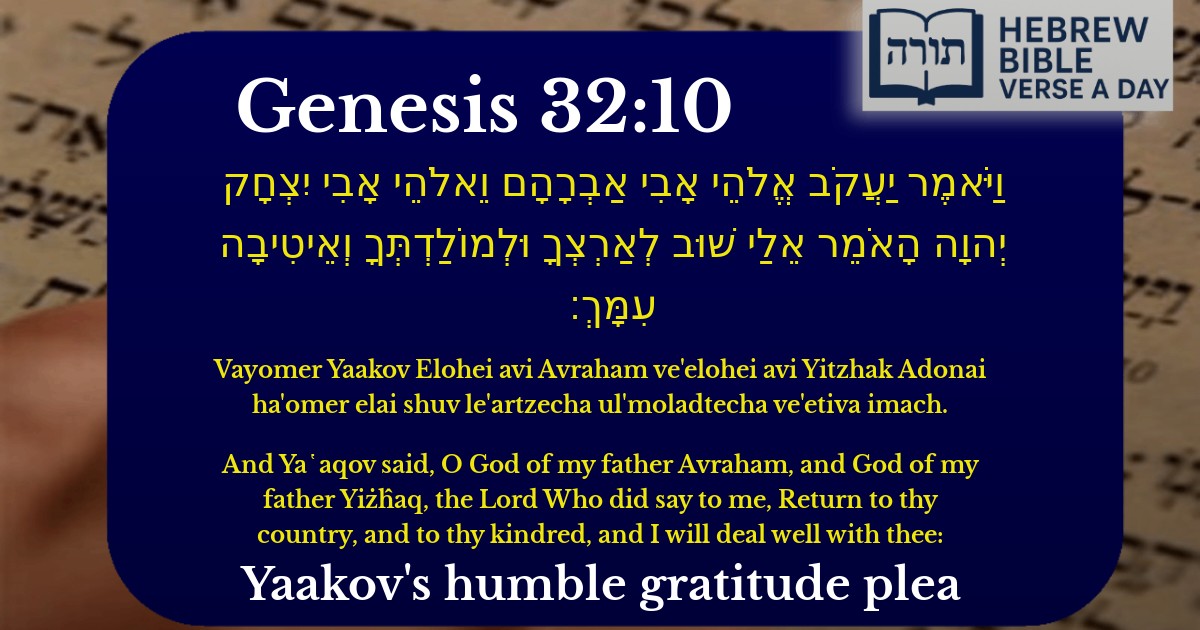Join Our Newsletter To Be Informed When New Videos Are Posted
Join the thousands of fellow Studends who rely on our videos to learn how to read the bible in Hebrew for free!
Hebrew Text
וַיֹּאמֶר יַעֲקֹב אֱלֹהֵי אָבִי אַבְרָהָם וֵאלֹהֵי אָבִי יִצְחָק יְהוָה הָאֹמֵר אֵלַי שׁוּב לְאַרְצְךָ וּלְמוֹלַדְתְּךָ וְאֵיטִיבָה עִמָּךְ׃
English Translation
And Ya῾aqov said, O God of my father Avraham, and God of my father Yiżĥaq, the Lord Who did say to me, Return to thy country, and to thy kindred, and I will deal well with thee:
Transliteration
Vayomer Yaakov Elohei avi Avraham ve'elohei avi Yitzhak Adonai ha'omer elai shuv le'artzecha ul'moladtecha ve'etiva imach.
Hebrew Leining Text
וַיֹּ֘אמֶר֮ יַעֲקֹב֒ אֱלֹהֵי֙ אָבִ֣י אַבְרָהָ֔ם וֵאלֹהֵ֖י אָבִ֣י יִצְחָ֑ק יְהֹוָ֞ה הָאֹמֵ֣ר אֵלַ֗י שׁ֧וּב לְאַרְצְךָ֛ וּלְמוֹלַדְתְּךָ֖ וְאֵיטִ֥יבָה עִמָּֽךְ׃
וַיֹּ֘אמֶר֮ יַעֲקֹב֒ אֱלֹהֵי֙ אָבִ֣י אַבְרָהָ֔ם וֵאלֹהֵ֖י אָבִ֣י יִצְחָ֑ק יְהֹוָ֞ה הָאֹמֵ֣ר אֵלַ֗י שׁ֧וּב לְאַרְצְךָ֛ וּלְמוֹלַדְתְּךָ֖ וְאֵיטִ֥יבָה עִמָּֽךְ׃
🎵 Listen to leining
Parasha Commentary
📚 Talmud Citations
This verse is quoted in the Talmud.
📖 Chullin 91b
The verse is referenced in a discussion about Jacob's prayer and his encounter with the divine, illustrating his devotion and the fulfillment of God's promise to him.


Invocation of the Divine Name
Yaakov begins his prayer by invoking "God of my father Avraham and God of my father Yitzchak" rather than addressing Hashem directly as "my God." Rashi (Bereshit 32:10) explains that Yaakov felt unworthy to claim the same level of personal relationship with Hashem as his fathers had attained. This demonstrates Yaakov's exceptional humility, a trait praised throughout Jewish tradition.
The Significance of the Double Reference
The Midrash (Bereshit Rabbah 76:1) notes that Yaakov mentions both Avraham and Yitzchak separately to emphasize that each had a unique relationship with Hashem. Avraham discovered Hashem through intellectual inquiry (as per Rambam in Hilchot Avodah Zarah 1:3), while Yitzchak maintained the tradition through mesorah (received tradition). Yaakov thus connects himself to both approaches to divine service.
Recalling the Divine Promise
Yaakov specifically mentions Hashem's command to return to his homeland (Bereshit 31:3). The Ramban explains that Yaakov is:
Theological Implications
The Sforno notes that Yaakov's phrasing establishes the continuity of divine providence across generations. By connecting Hashem's relationship with him to that with his fathers, Yaakov affirms the Jewish belief in a personal God who maintains covenantal relationships with descendants of the patriarchs. This becomes a model for all Jewish prayer, where we invoke the merit of our ancestors while seeking divine favor.
Linguistic Nuance
The Malbim highlights the change from "אֱלֹהֵי" (God of) to "יְהוָה" (the proper Name). This reflects a progression from the general concept of divinity to the specific, covenantal relationship denoted by the Tetragrammaton, showing Yaakov's growing awareness of his personal connection to Hashem despite his initial humility.